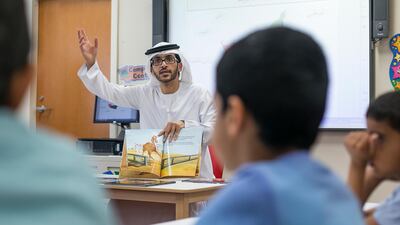Headteachers say they will struggle to hire specialist staff for children with special needs to meet new education regulations by next year.
School leaders spoke in response to new rules launched by the emirate's education regulator that state that all private schools in Dubai must be able to cater for special needs children by 2020.
Every existing teacher will need to be trained to play a greater role in the inclusion of those with learning difficulties and disabilities.
Schools must also provide one support teacher per 200 pupils and one learning support assistant for every 125 pupils.
“The challenge is training teachers. As per the framework, there are certain expectations, and not all our teachers are trained,” said Sonia Kohli, assistant headteacher at the Indian High School, the largest school in the country.
With about 14,000 pupils, she said it will struggle to hire one special educational needs teacher for every 200 of its children.
It school currently has 24 special needs teachers working on its senior campus, where there are 6,500 pupils, which works out as one for every 271 pupils.
She said the city's schools will have to find a KHDA-approved training institute for its teachers and fund the process.
The new regulations also call for every school to have an inclusion team, which must have an ‘inclusion champion’ to take the lead on making provisions for pupils of determination, support teachers and learning support assistants.
Louise Dawson, head of inclusion at Kings' School Al Barsha, also said that the school struggles to find qualified and experienced staff.
"We have to increase our number [of specialist teachers] quite considerably and finding them within the country is difficult," she said.
The school currently has a team of 35, and of those at least 10 have specialist qualifications.
"Some of our mainstream teachers have a SEN [special educational needs] qualification, but every child you put in front of a teacher is different, so the training required is personalised to each child," she said.
Melissa Skiles, head of inclusion at Dubai British School in Jumeirah Park, argued that many schools in Dubai are already working to become more inclusive.
"The challenges will vary by school. For some, the focus is on improving existing systems and procedures instead of completely starting over; however, some schools have a lot of work to do,” she said.
“Educating and training staff will be a significant undertaking for those schools with qualification programmes that don’t already mandate this as part of teacher training.
"You don’t necessarily need a lot of money to make these sweeping changes, but you do require the right people to lead and guide schools in how to be supportive and inclusive."
The new guidelines lay out, she says, that it is “unacceptable for schools to say, ‘we simply can’t help’”.
Matthew Tompkins, principal of Gems FirstPoint School, believes setting the right curriculum will be a challenge.
He said the new guidelines are "more of a culture shift".
The KHDA rules came as a response to requests from parents across the Emirates for greater inclusivity and integration in schools for children with special needs.
For Dubai resident Neena Raina, mother of 20-year-old Varun, who is on the autistic spectrum, finding a mainstream school that would accept her son when she moved to Dubai nearly eight years ago was a challenge.
"Having more inclusive schools would have helped me, as I came from Indonesia, where my child was helped by learning support assistants."
She said there is a distinction between 'integration' - placing a child in a mainstream class - and actual inclusion in lessons and school life.
"So schools are taking children but the child is not included," she said.
"The teachers have to be trained for it to work effectively.
"When they say 'inclusion', they have to involve these pupils in everything at school."
She said schools must cater for children with special needs outside of the classroom.
"If these children are always with shadow teachers, then they will become dependent on these teachers," she said.
Ms Raina co-founded Tender Hearts, a recreational centre for children with special needs in Dubai. There, children learn music, dance drama, art, sport, yoga, martial arts and how to communicate better.
The centre works closely with schools in Dubai and pupils from schools volunteer at Tender Hearts.
"When a class has 25-28 pupils in the class how will the teacher cater to all the needs of the pupils?
"It will work smoothly if you have a learning assistant who will help the teacher.
"Unless you get proper attention, there is no use putting a child in a mainstream school," she said.


